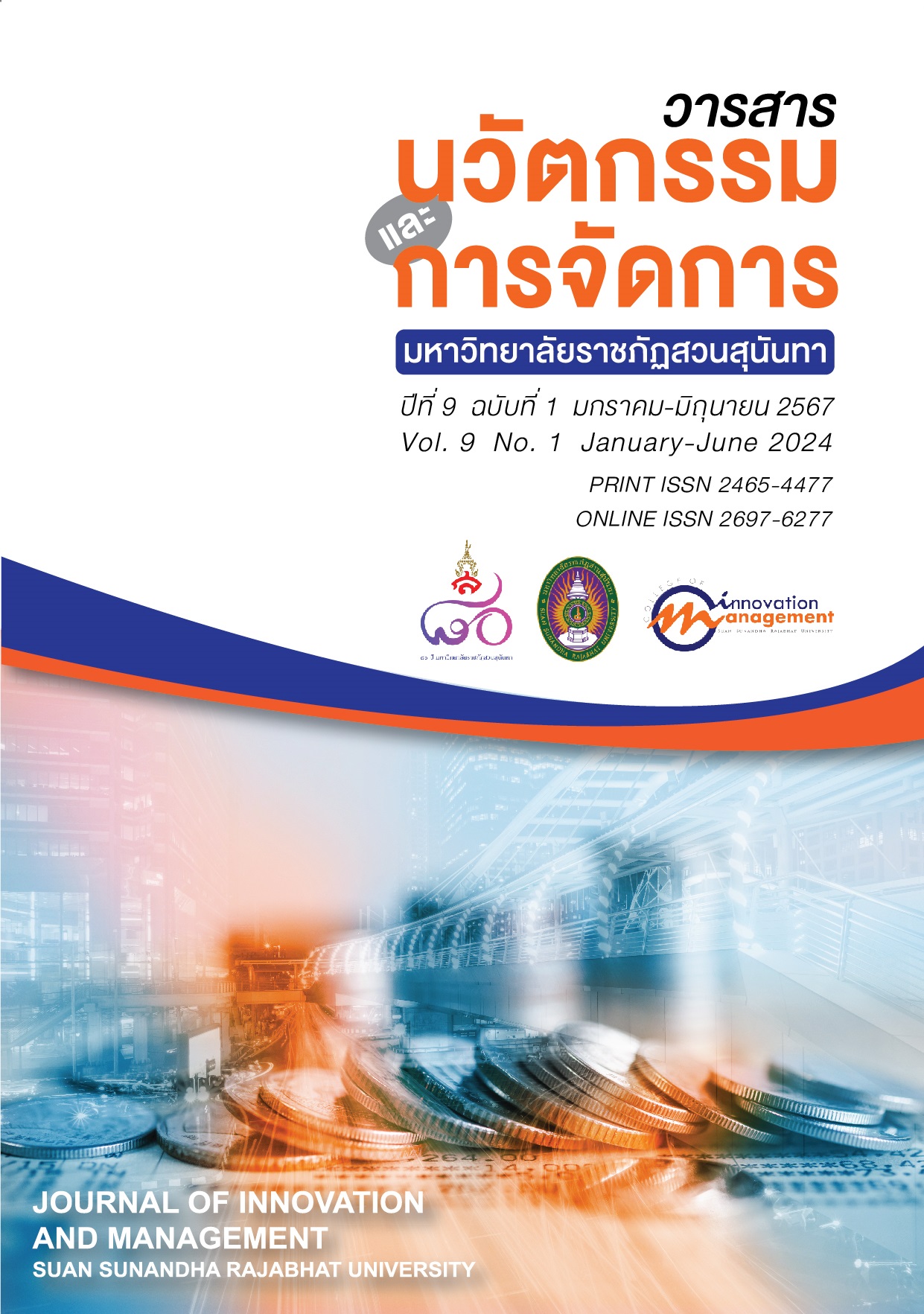Analysis of Full-Time Equivalent Students (FTES) per Full-Time Faculty Members for Academic Years 2020-2022 for Development of Educational Administration at Prince of Songkla University, Phuket Campus
Keywords:
Full-Time Equivalent Students (FTES), Educational Administration Management, DevelopmentAbstract
This study aimed to analyze the Full-Time Equivalent Students (FTES) at Prince of Songkla University, Phuket Campus from 2020 to 2022, aiming to enhance educational management. Data on Full-Time Equivalent Students (FTES) and faculty headcount were analyzed using predefined formulas. Deviations from the standard and average student-to-faculty ratios were examined. Strategic challenges, advantages, and opportunities were analyzed using the SWOT and PESTEL frameworks. Over the three academic years, FTES to faculty ratios were found as follows: for the F01 group, 13.89%, 13.00%, and 11.14% respectively; for the F02 group, 11.33%, 8.89%, and 8.61%; for the F03 group, 8.49%, 8.40%, and 10.43%; and for the F04 group, 6.00%, 5.37%, and 6.24% respectively. All groups had deviations from the standard not exceeding 10%, scoring below the set standard of 5. Prioritizing educational management development through the 'PHUKET' model.
References
ASEAN University Network (AUN-QA). (2020). The Guide to AUN-QA Assessment at Programme Level Version 4.0. [Online]. Retrieved October 20, 2023, from: https://shorturl.at/dgmv8
Bangkokbiznews. (2023). Workers must know! 10 important career skills today and in the next 5 years. [Online]. Retrieved February 19, 2024, from: https://shorturl.at/dPR03. (in Thai)
Hansopa, R., Subhakicco, S.P., Chusorn, P., Sonsuwan, S., and Bungsane, M. (2020). Learning Management in 21st Century: Theory toward Implementation. Dhammathas Academic Journal, 20(2), 163-172. (in Thai)
Kanadphol, A. (2023). Analyze the Efficiency of Expenditure Budget Income, Phuket Campus Office, Prince of Songkla University Phuket Campus, Fiscal Year 2019-2022. Journal of Arts Management, 7(3), 1053-1071. (in Thai)
Maringe, F. and Gibbs, P. (2009). Marketing Higher Education Theory and Practice. Glasgow: Bell and Bain. https://shorturl.at/imAU1
Ministry of Higher Education Science Research and Innovation. (2021). Policy for defining groups of higher education institutions (revised edition). [Online]. Retrieved December 6, 2023, from: https://shorturl.at/eqsQY. (in Thai)
Office of the Higher Education Commission. (2014). Manual for the Internal Quality Assurance for Higher Education Institutions 2014). [Online]. Retrieved October 20, 2023, from: https://shorturl.at/alsPZ. (in Thai)
Panich, V. (2013). Creating learning for the 21st century. Bankkok: Charoen printing. (in Thai)
Parnpoothong, R. (2023). A Study of Guideline for Using the Full-Time Equivalent and the Ratio of Academic Staffs to Student Analysis to Curriculum Administration Plan in Faculty of Education, Naresuan University. Council of University Administrative Staff of Thailand, 12(3), 45-55. (in Thai)
Policy Strategy and Planning Division. (2023). Full-time student information (FTES). Prince of Songkla University. [Online]. Retrieved October 16, 2023, from: https://shorturl.at/ciuOX. (in Thai)
Prince of Songkla University Phuket Campus. (2023). Vision Mission Prince of Songkla University Phuket Campus. [Online]. Retrieved December 20, 2023, from: https://www.psu.ac.th/phuket/vision-mission/. (in Thai)
Saengduenchay, R. (2020). Internal educational quality assessment at the curriculum level academic year 2014 -2019. Journal of Graduate MCU KhonKaen Campus, 7(4), 283-298. (in Thai)
Sangcharoon, S., Usaho, C., Siribanpitak, P. (2020). Graduate Production Management Strategies based on the Concept of National Economic Sustainable Development. Journal of Education Studies, 48(1), 332-335. (in Thai)
Siriyota, C. (2022). An Analysis of the Number of Full-time Equivalent Students to the Number of Full-time Teachers (FTES) Affecting the Implementation of Internal Educational Quality Assurance at Faculty Level, Academic Year 2016-2020, of the Faculty of Engineering a University. Council of University Administrative Staff of Thailand, 11(3), 78-87. (in Thai)
Sopa, A. (2022). Cost Per Unit and Break - Even Point of Curriculum Administration Faculty of Education Nakhon Phanom University Year 2020. Journal of Education Faculty of Education Nakhon Phanom University, 3(1), 1-15. (in Thai)
Thainta, S. (2018). Analysis of the difference between the number of full-time students (FTES) per full-time faculty member of Chiang Mai Rajabhat University. Chiang Mai: Chiang Mai Rajabhat University. (in Thai)
Voss, R., and Gruber, T. (2006). The desired teaching qualities of lecturers in higher education: a means end analysis. Quality Assurance in Education, 14(3), 217-242.
William, J. P. (1997). Teaching and Research Quality Indicators and the Shaping of Higher Education [Paper presented]. The Proceedings of the 37th Annual Forum of The Association for Institutional Research, 18-21 May 1997, Orlando, Florida.
Zhang, J. (2023). The Effectiveness of Recip1997rocal Peer Teaching in an EAP Class. English Language Teaching, 16(2), 35-42.
Zohrabi, M. (2013). Mixed Method Research: Instruments, Validity, Reliability and Reporting Findings. Theory and Practice in Language Studies, 3(2), 254-262.
UNESCO Institute for Statistics. (2023). Full-time equivalent number of students. UNESCO Institute for Statistics. [Online]. Retrieved October 20, 2023, from: https://shorturl.at/uAC38
Downloads
Published
How to Cite
Issue
Section
License
Copyright (c) 2024 Journal of Innovation and Management

This work is licensed under a Creative Commons Attribution-NonCommercial-NoDerivatives 4.0 International License.
See Publication Ethics https://so03.tci-thaijo.org/index.php/journalcim/Ethics






